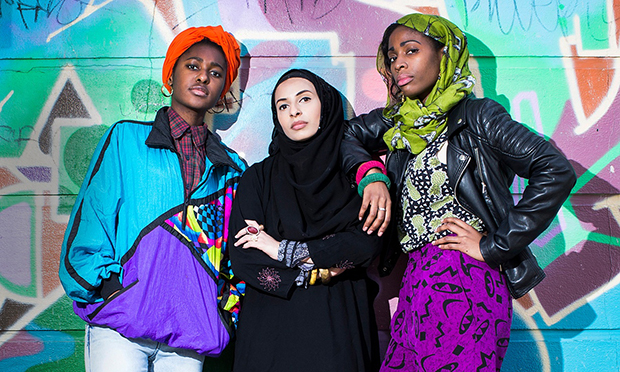Statement from the creative team behind Homegrown
At the beginning of this year the National Youth Theatre approached us with an idea for a show – to create a large-scale, site-specific, immersive piece looking a the radicalisation of young British Muslims. The original commission was intended to use the Trojan Horse affair as its lens, although very early in our process that angle was abandoned in favour of something more nuanced. Homegrown was intended to be an exploration of radicalisation, the stories behind the headlines and the perceptions and realities of Islam and Muslim communities in Britain today. It’s important to state, however, that we had a number of reservations about making a play about ‘British Muslims going to join ISIS’. Throughout our careers, we have resisted playing to the logic of the entertainment industries and their particularly crude game of identity politics. Homegrown wasn’t to be FUBU – For Us By Us. We weren’t force-feeding our views to mindless young people, but exposing an astute and thoughtful young cast to the full spectrum of voices who are currently having that very conversation about radicalisation. We were giving them certain tools – a language, really – and then allowing them to work their way through it all. Over six months of assembling our enormous cast and workshopping ideas, we were very clear about exactly what we were making, and that the drive behind this was to create a piece of theatre which unsettled all the preconceived ideas people would come with to this subject matter.
Given our assumed closeness to the material, many would have expected us to have some kind of insider perspective to the constant barrage of questions and curiosities in today’s relentless conversation around Islam and it perceived modern day hang ups. We’re told to give serious attention to culture. It’s now said that culture is a matter of life and death – where being able to tell apart the Good Muslim and the Bad Muslim has become a central tenant of this warped, militarised worldview. Homegrown had no answers or solutions, no agenda or mission statement. It didn’t seek to educate, repair or improve people – but something in you would have shifted, we hope. If anything, we wanted to turn this kind of culture talk on its head.
Trouble was first encountered when the day after announcing the show to the press, our original venue of Raine’s Academy in Bethnal Green withdrew, after pressure from Tower Hamlets council. We were asked to be silent on the council’s pressure, so that a new venue could be secured with no problem – the official party line would be “logistical issues”. The show then had to be signed off by Camden Council in order to secure us our eventual venue of UCL Academy. We went into rehearsals with 70% of the show scripted (and signed off by NYT), and the remaining 30% to be devised with the cast during rehearsals. In a production meeting in the first week we were told that a meeting between the NYT and the police had taken place. We do not know who instigated that meeting, as we were not made aware of it until it had happened. The police wanted to read the final script, attend the first three shows, plant plain clothes policemen in the audience and sweep with the bomb squad. When we protested these measures, we were told the police held no power of ultimatum, and the issue was never raised again.
Rehearsals were brilliant, on schedule, and exceeded all our expectations. We were filled with nothing but admiration and deep respect for our amazing brave cast – who were really taking the material and running with it. We were then exactly halfway through rehearsals when we received an email late at night from NYT to tell us that Homegrown was cancelled. We would have done our first full run of the show two days after that. There was no warning, no consultation and no explanation. All our attempts at meetings with the NYT since then have been delayed and then cancelled.
In terms of the current discussions around censorship and artistic freedoms, it’s important to us to clarify that the cancellation of Homegrown doesn’t fall into the same categories as Bezhti, Exhibit B or The City. The tendency to conflate all these cases does a disservice to the nuances of each – and in some instances banalises the legitimate anger they have created. There’s qualitative differences between a show pulled due to pressure exerted by particular groups or communities and Homegrown, which came under the watchful gaze of both formal institutions and arms of the state. There’s no question that had the show been cancelled due to Muslim rage, then we would be celebrated as contemporary Salman Rushdies – courageous bastions of free speech fighting off conservative or reactionary forces within our imagined communities rather than as either incompetent artists or unrefined agitators. We jump to support artists struggling to make work in the regimes of the East, but here in our haven of Western liberal democracy, we hesitate to stand behind those pushing against some of that very same, more insidious, authoritarianism. We’re all making art in a particular political climate – which includes Prevent and Channel. These are programmes which, although intended to stop people getting drawn towards violent extremism, are creating an environment in which certain forms of questioning of the given narrative pertaining to radicalisation or extremism can be closed down. If the acceptable parameters of this discussion are to remain that of inarticulate, mad mullahs in one corner, self-hating Ayaan Hirsi Alis in the other, all refereed by think tank dwellers such as Maajid Nawaaz – then this vital conversation will continue to go nowhere.
Signed, Nadia Latif (director and co-creator), Omar El-Khairy (writer and co-creator)

